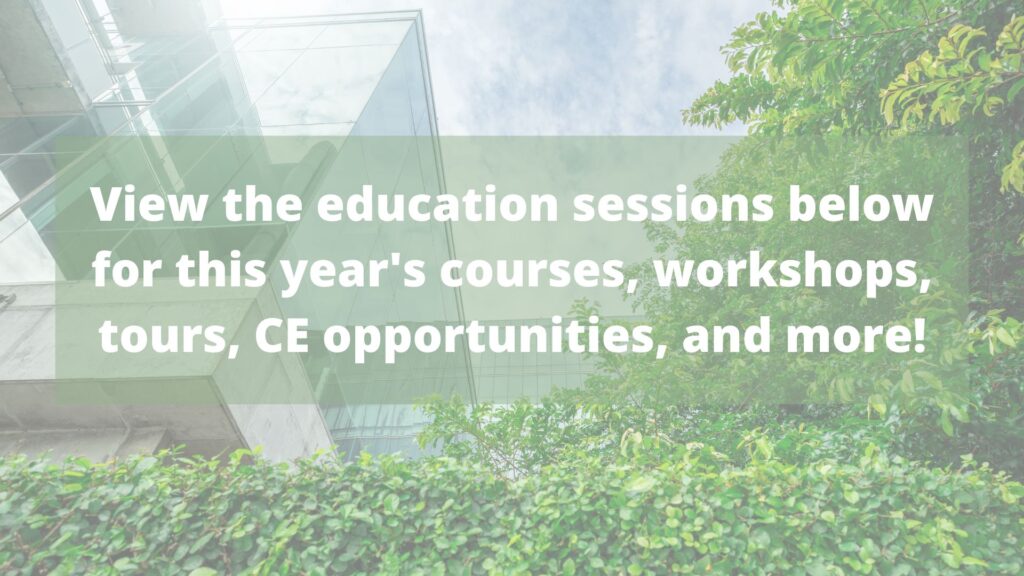
The session agenda is designed for everyone within the green building community. Our Advisory Groups carefully selected all of this year’s sessions to address the opportunities and challenges you and your project teams face today. To register today, please click within.
The content below was created by USGBC regarding their yearly Greenbuild Conference. Explore sessions at Greenbuild that will focus on meeting net zero goals.
As climate-related goals grow increasingly more urgent, the green building community has set its sights on net zero. Ensuring our built environment meets zero energy, zero carbon and zero waste goals can help save our planet’s resources and create a better life for everyone.
As the global green building community’s top space for learning, networking and sharing insights, Greenbuild 2024, “Built to Scale,” will offer more than 100 sessions on the most critical topics in the industry. The conference will take place Nov. 12–15 this year in Philadelphia.
Take a look at a small sample below of opportunities to engage in learning about net zero and decarbonization strategies, and explore the full Greenbuild education program when you register to attend. You can sort by track, topic, learning level and more.
Achieving Zero Waste Goals with TRUE Workshop
Tuesday, Nov. 12, 1-5 p.m.
Greenbuild’s 2024 workshops are half-day, tailored opportunities to connect with experts in your field and receive real-time solutions to your challenges. Three all-new workshops this year will bring you technical and hands-on perspectives to accelerate your projects. Workshops are available only for attendees with a Conference or Student pass.
TRUE is the first zero waste certification program dedicated to measuring, improving and recognizing zero waste performance through sustainable resource management. Administered by GBCI, TRUE enables facilities, portfolios, events and construction sites to achieve their zero waste goals, supporting decarbonization efforts and public health. This workshop will provide a deep understanding of TRUE certification and equip attendees with the essential tools to transform their waste management approach into a commodity-driven, resource-centric plan that contributes to a circular economy. This interactive workshop teaches the importance of stakeholder engagement, steps for collecting the right data, the zero waste hierarchy and tools for effectively communicating results to build support for TRUE certification. Case studies from TRUE-certified facilities will be covered, including the renovated USGBC headquarters.
Making Zero-emissions Buildings the New Normal
Wednesday, Nov. 13, 3–4 p.m.
This session examines the enabling factors making zero-carbon buildings possible, how USGBC and our members are leading the way, the current policy and market drivers, and what future developments to watch for. Every day, more owners are committing to the goal of zero carbon emissions, and more buildings are achieving these conditions—there are well over 100 LEED Zero projects around the globe. USGBC, members and government agencies have incentivized best practices for buildings, and recent advances and rapid adoption of technologies have become key factors in creating more zero-emissions buildings. The National Definition for Zero Emission Building, local ordinances and other policies are poised to further accelerate zero emission buildings. Market forces are influencing increased corporate commitments. Speakers will explain the interplay among these drivers, and new tools like LEED v5, in creating momentum and a broad transformation.
We Can’t Wait Until 2050: Reaching Zero Embodied Carbon Today
Wednesday, Nov. 13, 3–4 p.m.
A stable climate demands that buildings radically reduce their carbon footprint and move toward carbon neutrality by 2050. Electrification, advancements in efficient decarbonized building systems, and an accelerating clean grid put zero operational carbon within sight. Meanwhile, the path to zero embodied carbon is harder to see. Is zero embodied carbon possible today? This structured discussion will identify legitimate pathways toward radical embodied carbon reduction on projects now, and will explore other major sources of carbon emissions that must be tackled to truly bring us to a zero-emissions built environment. A sustainability specialist, academic researcher, architect, structural engineer and developer will share different ways to approach this challenge and will address the Life Cycle Impact Reduction credits in LEED.
View the full education lineup.
![]() John Caravella Esq., is a construction attorney and formerly practicing project architect at The Law Office of John Caravella, P.C., representing architects, engineers, contractors, subcontractors, and owners in all phases of contract preparation, litigation, and arbitration. He also serves as an arbitrator to the American Arbitration Association Construction Industry Panel. Mr. Caravella can be reached by email: [email protected] or (516)462-7051
John Caravella Esq., is a construction attorney and formerly practicing project architect at The Law Office of John Caravella, P.C., representing architects, engineers, contractors, subcontractors, and owners in all phases of contract preparation, litigation, and arbitration. He also serves as an arbitrator to the American Arbitration Association Construction Industry Panel. Mr. Caravella can be reached by email: [email protected] or (516)462-7051
The information provided on this website does not, and is not intended to, constitute legal advice; instead, all information, content, and materials available on this site are for general informational purposes only. Readers of this website should contact their attorney to obtain advice with respect to any particular legal matter. No reader, user, or browser of this site should act or refrain from acting on the basis of information on this site without first seeking legal advice from counsel in the relevant jurisdiction. Only your individual attorney can provide assurances that the information contained herein – and your interpretation of it – is applicable or appropriate to your particular situation. Use of, and access to, this website or any of the links or resources contained within the site do not create an attorney-client relationship between the reader, user, or browser and website authors, contributors, contributing law firms, or committee members and their respective employers.
